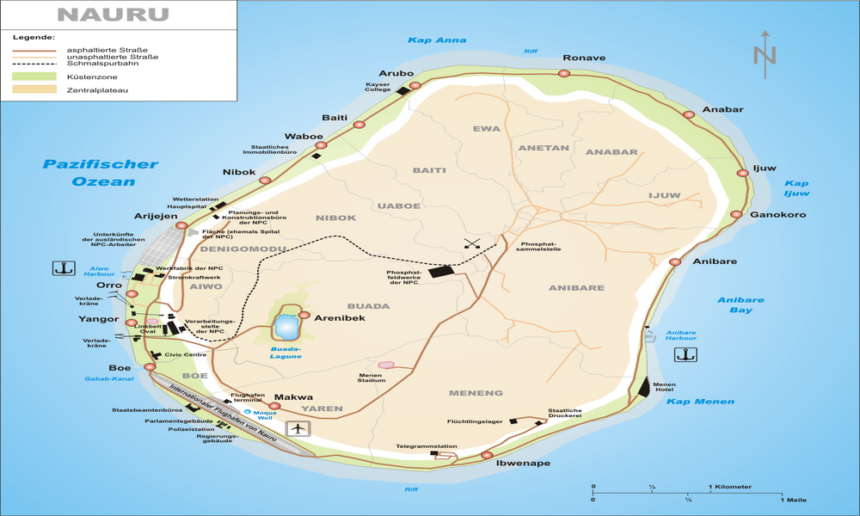Minister of Finance David Aideang of Nauru, which was once considered to be the wealthiest country in the world, announced that the country could no longer make payroll for government employees, schools and hospitals because they are closing down and they are no longer able to supply everyday goods.
In 1995 the Government of Nauru defaulted on payments for the “Samurai” bond of 1989, which was worth five billion JPY. An American fund that bought into this bond for $26 million was unable to recover their investment and consequently went to court for numerous years, in the end the court ruling was to freeze all assets of Nauru held in foreign accounts. Thus, the Government was unable to access their funds held in the Australian bank Westpac.
Nauru, a small island country located in the Pacific between Hawaii and Australia, started exporting their resource of phosphate, which is one of the most effective fertilizers, in the 1960-70’s. Through the revenues from these exports, their GDP per capita rose to be one of the highest in the world. Nauru gained independence in 1968 and was never able to break its complete economic dependence on mining. Nauru went through many years with the rise and fall of natural resource prices and the government was very ineffective and irresponsible in its leadership during this time.
When the price of their only mineral recourse was high, the leaders of the country were making luxurious purchases such as Boeing 737 airplanes and expensive cars, as well as constructing luxury houses and hotels. The government established an investment fund and by the 1980s had spent about one billion dollars on various expensive and unprofitable projects. The citizens of Nauru don’t pay taxes, and 95% of the workforce is employed by government agencies. Workers from nearby countries did all the manual labor while the people of Nauru spent their days relaxing on the beach. All hospitals and schools were free of charge, and should anyone require outside medical care the government would fly them to Australia with governmental funds. People from Nauru used to rent private planes in order to go shopping in Guam, Hawaii, and Singapore. The citizens didn’t ask for change when making purchases under $50.
The Presidents of the time used to take national airline aircrafts for vacations in foreign countries, leaving the people with purchased tickets to gaze after them in perplexity. Nauru is famous for allowing others to open offshore accounts without any difficulties. The Central Bank of Russia announced that by 1998 the Russian Mafia had $70 billion in offshore accounts on the island. (“The Economist”, December 20, 2001). Even with a speed limit of 20mph, the Chief of Police had a yellow Lamborghini brought over but his weight made it impossible for him to fit behind the wheel. One third of the employable-aged citizens are unemployed, and due to irresponsible eating habits the rates of obesity (95% of the population over 15 is obese) and diabetes are among the highest in the world. There is even a competition called “Bigger the Better” that is organized for entertainment.
Due to the depletion of their phosphate resources and the lack of any other industry, Nauru managed to waste all of its own and others’ capital. They did not spend their income from phosphate sales wisely. While revenues were high they stopped support for fishing, which was their main industry, and stopped educating their children, especially at the level of higher education.
On top of this, they failed to take environmental restoration into consideration, leaving large holes in the mining process, and thus making agriculture impossible. This left the citizens with no choice but to migrate off the island in large numbers.
Since 2001, Nauru has run an asylum project for people who attempt to immigrate into Australia illegally, and for this they receive a large annual fee from the Australian government. In just 2014 they have received about $100 million Australian dollars. The Asian Development Bank has announced that currently Nauru has no private enterprise, no land for agriculture, very low clean water resources, large amounts of debt, and no sources of government income.
The government of Nauru is currently engaged in court cases with lenders on the basis that despite their default on bond payments no foreign court has the right to freeze the assets of an independent nation. During one of such court hearings held in Australia, the government representatives of Nauru let it be known that they would no longer be able to provide food, water, and electricity to the 1200 immigrants that are currently being housed in Nauru and this could place them at mortal risk.
Professor John Connell of the University of Sydney has said “the current state of Nauru is not just a tragedy but is the result of the leadership’s inability to produce a rational development plan”.
Only people can create wealth, and profits from the sale of natural resources should be used to provide the opportunity for people to work. In order for people to work and create value there has to be innovation and a continuous increase in knowledge and experience. Governments need to be visionary, transparent, responsible and work to fulfill its responsibility to create competition in the private sector and protect personal rights and property.
The story of Nauru’s road from heaven to hell shows us what awaits a country unable to fulfill either or both of these requirements.
2014.10.08












